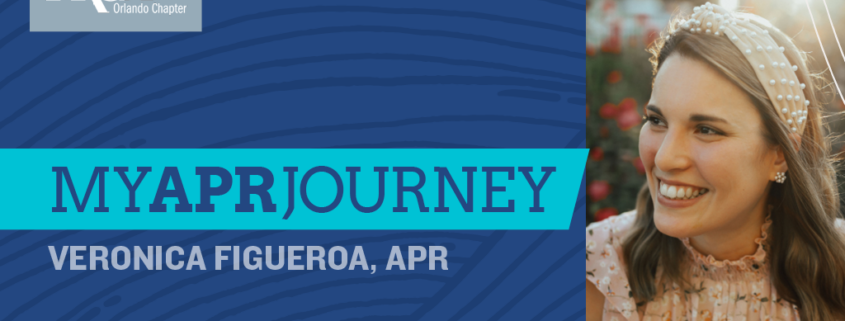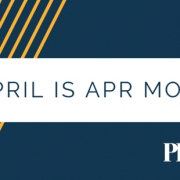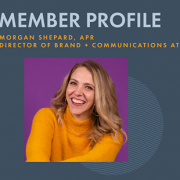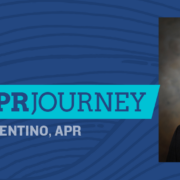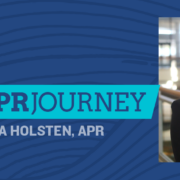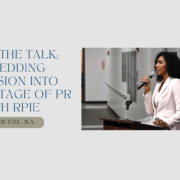My APR Journey: Veronica Figueroa, APR
When PRSA Orlando asked Veronica Figueroa, APR, what inspired her to pursue Accreditation in Public Relations (APR), she reflected on her passion for professional growth and leadership.
“After more than a decade in public relations, I wanted to challenge myself and deepen my understanding of the profession,” she shared. Serving on the PRSA Orlando board since 2020 and preparing to step into the role of chapter president in 2025, Veronica saw earning her APR as a way to lead by example.
Her journey, filled with determination and reflection, offers valuable lessons for anyone considering this credential.
What motivated you to pursue the APR?
After more than a decade in public relations, I wanted to challenge myself and grow both personally and professionally. The APR felt like the next step to deepen my understanding of the profession and solidify my expertise.
Serving on the PRSA Orlando board since 2020, and previously on the Diversity, Equity & Inclusion committee in 2019, has been instrumental in shaping my perspective. These roles taught me about leadership, collaboration and the importance of fostering inclusivity within our industry. As I prepared to step into the role of chapter president in 2025, I felt it was important to lead by example and demonstrate a commitment to lifelong learning.
Earning my APR wasn’t just about the credential – it was about staying sharp in a constantly evolving field. With media landscapes shifting and ethics in communication under greater scrutiny, pursuing the APR reflected my dedication to staying ahead and contributing meaningfully to our profession.
How did you prepare for the panel presentation and examination?
Panel Presentation Preparation:
To prepare for the APR Panel Presentation, I attended PRSA Orlando’s workshops and leveraged PRSA’s resources. The most helpful to me was the webinar titled “APR Panel Presentation: Secrets to Success” by Juanita Traughber, MBA, APR. Juanita guided viewers through her presentation, emphasizing the RPIE framework. This webinar, free for members on MyPRSA, is a must-watch.
I also sought feedback from trusted colleagues who provided constructive critiques on my questionnaire and presentation, and I scheduled a mock panel. Treating the mock panel as seriously as the real one helped calm my nerves and refine my presentation.
Examination Preparation:
Studying for the examination was more challenging. I dedicated 30 minutes to an hour of my lunch breaks and evenings to review the APR Study Guide. Closer to the test, I spent a full day at Starbucks and the Winter Garden Library reading the guide cover to cover, referencing the book for clarity on topics like the RPIE framework. But I’m not sure I recommend that. It was a long day!
When tackling business literacy, I used ChatGPT for real-life examples of concepts like the “gag period,” “blackout period,” and other terms, which helped solidify my understanding beyond the definitions provided by the study guide.
Additionally, I purchased the APR Practice Examination on MyPRSA. Although it featured only 20 questions — fewer than expected — it helped familiarize me with the test format. PRSA’s free sample test was also a valuable resource.
What was the most challenging part of the process, and how did you overcome it?
Overcoming my mental roadblocks was a significant part of my APR journey. Despite over a decade of experience in public relations, I often felt like I wasn’t good enough and caught myself comparing my progress to colleagues who had already earned their accreditation. Reaching out to those colleagues was a turning point. Hearing their stories — how some struggled with the panel presentation or had to retake the exam — helped me realize that everyone faced challenges. These honest conversations grounded me and reminded me that perseverance, not perfection, was key.
Balancing preparation with motherhood was another challenge. As a mom to a rambunctious toddler, I had to be strategic about finding time to work on my presentation and study. I carved out lunch breaks and the time right after work, before daycare pickup, to stay on track. While some people thrive by studying early in the morning or late at night, I quickly discovered that wasn’t an option for me — reading more than a page of the guide at night usually ended in an unintentional nap.
When I needed to focus on weekends, my husband stepped in to care for our son, giving me the uninterrupted time I needed to prepare. It wasn’t easy, but with support and a realistic approach, I was able to overcome the obstacles and stay committed to my goal.
How has earning your APR impacted your career or perspective on the profession?
Earning my APR has been transformative, both professionally and personally. It deepened my understanding of the strategic foundation behind public relations and reinforced the importance of the RPIE framework in every campaign and initiative. The process challenged me to think critically, sharpen my problem-solving skills and approach PR with a broader perspective.
Professionally, it’s elevated my confidence and credibility, opening doors to new opportunities and strengthening my voice as a communications leader. I’ve also gained a renewed appreciation for the profession’s impact and the value of ethical, well-planned communication strategies.
On a personal level, earning my APR proved that I could overcome challenges and succeed, even when self-doubt crept in. It’s a reminder that growth often comes from pushing outside of our comfort zones. Ultimately, the APR has not only enhanced my career but also deepened my commitment to advancing the profession and mentoring others on their journeys.
What advice would you give to someone considering the APR?
Don’t rush to formally apply for the APR until you’re confident your questionnaire is in a solid place. I attended half of the spring workshops, revised my questionnaire (probably more times than necessary), and had it reviewed by our APR Chairs before registering. This approach allowed me to maximize my preparation time. Since you have a full year from the date of registration to complete the exam, I felt like I “hacked the system” by getting a head start.
Also, don’t underestimate the value of reaching out to colleagues who’ve earned their APR. Whether you need practical tips or just someone to vent to, they understand the process and can offer valuable insights and support.
What’s one key takeaway or lesson you gained from the experience?
A key takeaway for me is the importance of building confidence. Throughout the process, I often doubted my ability to earn my accreditation, and even when I saw that I passed, it felt surreal. I’ve realized I’m my own toughest critic and need to work on believing in myself. Maybe it’s time to hang a “Believe” poster on my wall, just like in Ted Lasso!
Thinking About the APR? Let’s Connect!
If you’re considering pursuing your APR, PRSA Orlando is here to support you. Our APR Chairs are ready to provide guidance, share resources and answer any questions you may have about the process.
Don’t hesitate to reach out to take the first step toward earning this distinguished credential. Visit prsaorlando.com to learn more.

